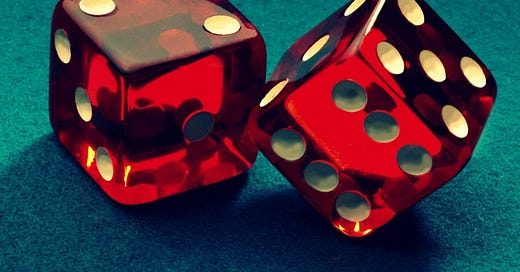Odds, probability, and nonsense
How very smart people fool themselves into thinking their fantasies are buttressed by "science".
We use terms associated with odds or statistics very loosely in our speech and writing. “What are the odds of Biden winning the election?” “How likely is it that the Patriots will make the playoffs?”
Or perhaps in referencing a scientific “study”, a person will conclude, “Girls are 63% more likely to use social media than boys.”
Well, sloppy language leads to sloppy thinking.
That’s just not how odds work. It’s not even really how statistics work. Here’s an example of a true statement about odds: “A fair die, thrown in a random way, on a standard craps table, has a 1 in 6 chance of any particular number being displayed on the top of the cube when it comes to rest.”
There. That’s odds. A closed system. An assumption of randomness. All this yields a true understanding of odds. The further our mental models move away from this kind of purity, the less they have anything to do with “odds”.
I bring this up because all too often, I’ve heard or read very smart people saying things like this:
“There’s a billion to one chance we’re living in base reality.” (in reference to simulation theory)” —Elon Musk
Nick Bostrum (another very smart person) has made the same kinds of statements.
Their argument is straightforward:
Clearly humans like to make simulations of reality and immerse themselves in them. See: all video games, particularly the new virtual reality varieties.
Human technology has done nothing but advance, and shows no sign of slowing.
Therefore, human tech will one day advance to the point where we will be able to create simulations that are indistinguishable from reality from the perspective of the humans in the simulation.
Therefore, the chances are microscopic that you, and me, and your mom, and Elon himself are actually living in “base reality” rather than one of the trillions of simulations that surely will be created once humanity has figured out how to do so — which they inevitably will.
Great argument. Very compelling. Maybe it’s even true. Who knows? What I do know is that this argument has nothing to do with statistics or odds.
You cannot derive odds for an “event” where you have zero data points to work with. This is entirely conjecture. You have simply claimed that humans will one day invent simulations that are indistinguishable from reality. It’s just an bald assertion based on nothing but guesswork.
Naked decrees don’t become “odds” just because you say so, folks. That’s not how math works.
I first heard of (or recognized) this kind of faulty “scientific” reasoning back in high school when somebody first introduced me to the Drake Equation.
Frank Drake attempted to derive (oh, so scientifically) the probable number of detectable civilizations that exist in the universe by adding together a bunch of wild-ass guesses about the likelihood of star formation, life-supporting planetary bodies, life developing into civilizations, civilizations emitting detectable signals, etc.
All wild conjectures mashed together into an “equation” that supposedly gave the chances that intelligent life was out there and could be discovered by us.
I swear, call something “math”, or “a study”, or “science”, or (Lord, save us all) form it into an “equation”, and us rubes will believe damn near anything.
To Drake’s credit, at least he had one data point (us). The “indistinguishable from reality simulation” odds-makers have zero.
There are thousands of other examples of this kind of lazy pseudo-science out there. You’ll hear people talking this way when assessing the “odds” that Artificial General Intelligence will be created.
We also tend to speak with statistical ignorance when we extrapolate findings from some terribly performed study as if they told us something about the entire populace.
We are a funny species. We like to pretend we know the “odds” when we’re just guessing.
And there’s nothing wrong with guessing. I kind of like Bostrom’s and Musk’s musing about whether we are or are not a simulation. Also, I like speculating about whether or not we are alone in the universe.
Just don’t pretend to know something you don’t. I’m gonna call bullpoop on that every time.
Yeah. There. I said it: Bullpoop.
Naturally,
Adam




NUMBERS DON'T LIE! :D
because only people do that... with numbers
I like using this same line of thought to "prove" that we were Intelligently Designed: we are always trying to create something "alive" whether bioengineered or AI. We get more advanced all the time, so sooner or later we will succeed and become Intelligent Designers of life. This means we could easily be the result of such an Intelligent Design ourselves. And by the logic of Musk et al, the "probability" of this is zero. So, we are in a simulation AND were Intelligently Designed. QED
Small piles of male bovine elimination.